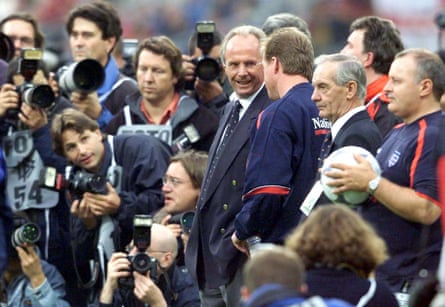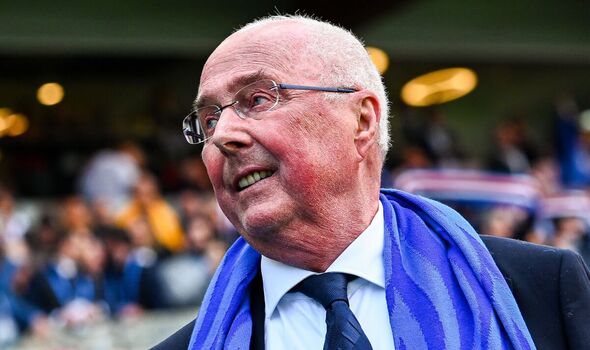The applause will fill stadiums across Europe to honour Sven-Göran Eriksson, marking a life well lived with a broad legacy in football, but for me a moment of silence 23 years ago will always resonate when England’s first overseas manager comes to mind.
You don’t normally associate football with quiet, but 1 September 2001 was not a normal occasion. Perhaps it wasn’t real, just all in my head. Rewatching on DVD, it’s just a low hum preceding the roar. But as Michael Owen closed in on Oliver Kahn, three minutes after half-time, the goalline he was approaching was separated from most of the visiting supporters by the length of the pitch and the curve of the Olympiastadion’s athletics track. Emile Heskey headed David Beckham’s cross down; Owen shot; Kahn dived; and we were suddenly thrust into a live version of A Question of Sport’s “What happened next?” round. Momentarily the world around me seemed to stand still, even if the recording suggests otherwise
The memory may be defective yet is perfectly fresh. The home fans know what has happened and are stunned but in an already disbelieving away end, we cannot be sure. Then Owen wheels away joyfully. The silence is replaced by euphoria. England are leading Germany 3-1 on their own patch and it doesn’t get better than that.
Except, of course, it did: Owen completed his hat-trick, then the “5-1 – even Heskey scored” chant was born. Yet as we mourn Eriksson, there is a danger of seeing this high as somehow a negative.
International football is meant to be about the tournaments. Reaching them can bring a rush, but the lasting memories, for good or ill, are supposed to be made by what happens when you get there – at least for a country with England’s football reputation, sense of self-worth and (just about) record. If you scan a sceptical eye down the results of the remaining four and three-quarter years that Eriksson was in charge, then Munich itself, and not just that sound of silence, looks illusory. It was Germany, not England, who contested the next year’s World Cup final, and no Eriksson team made even the last four of a tournament. But the context gives the lie to that.

Graham Taylor had buried the feelgood factor of Italia 90. Euro 96 was joyous yet led nowhere, given Terry Venables’ scheduled departure. Glenn Hoddle squandered his France 98 achievements on faith healers and ill-judged media adventures before Kevin Keegan exposed his limitations and, it seemed, those of the English game as a whole. Indeed, the appointment of a foreign manager was seen as further proof of English decline.
It seemed to be a hospital pass. After Keegan had resigned in the dressing room when Germany won the last game at the old Wembley in October 2000, Howard Wilkinson, as caretaker, left Owen on the bench for the whole of the 0-0 draw in Finland then all but wrote off the campaign. The talk, as Eriksson mulled over an offer, was of a second qualification failure in three World Cups.
Paradoxically, it needed an outsider to demonstrate that, however poor the coaching and man-management had been, there was plenty of talent to identify, to utilise, to nurture, to unleash – such as Owen, who was back to starting every meaningful game.
The sense of doom the previous autumn had, in fact, been overstated: second place meant a playoff, after all, and a run of wins – Finland at home, Albania and Greece away – meant Munich was, in some regards, a free hit. Lose, and there was time to regroup; win, and there was an unlikely route to topping the group, Germany having been held by Finland.
Easier said than done. But in a critical way it wasn’t about the doing, it was about the saying: yes, it was improbable that England could win in Munich, but no, it was not impossible.
Germany scored early, through Carsten Jancker with a goal that could have destroyed confidence – under Hoddle, or Keegan, or Wilkinson it surely would have. But the message had got through about the improbable as opposed to the impossible, about the free hit: England kept playing, Owen soon equalised, and on the stroke of half-time Steven Gerrard arrowed the ball into the net’s left corner. And that was just the beginning.
Over the remaining five years and beyond, it sometimes seemed that Fleet Street could not forgive Eriksson for Munich. Along with that silence I sensed in the stands, there must have been similar pauses in the minds of the press-box legions who were made to eat their words that night. The Daily Mail had greeted the arrival of the man behind a victory for the ages with a story headlined: “We’ve sold our birthright down the fjord to a nation of seven million skiers.” Every goal was a rebuke.
His conduct away from the action – his affairs and the flirtation with Chelsea – were irrelevant to his fitness for the job, but were eagerly seized upon by journalists who would, themselves, swap employers for the right sum. You can argue against his performance in finals, especially 2006, but even if you ignore the injury misfortune of 2002 and 2004, the two managers before Eriksson and the first three that followed managed one quarter-final between them.
Focusing on qualifying, in two-and-three-quarter campaigns, Eriksson dropped 11 points – the same number Hoddle and Keegan lost in limping to Euro 2000. Once the Swede was forced out and the hostile media got the English coach they wanted, Steve McClaren dropped 13 points in not making it to Euro 2008. Journalists that called for Eriksson’s dismissal on the Monday mornings after his teams qualified never issued mea culpas for what followed when they got their wish.
Watching England has taught me never to take qualification for granted and that we can get a bad result against anybody. Munich taught me that we can get an astonishing result against anybody, too. Thank you, Sven.








More Stories
Amorim insists Fernandes not leaving Manchester United amid Madrid reports
How debt burden pushed Nigerian boxer Segun Olanrewaju to a fight that took his life
Nigeria Taekwondo Federation boss, Abdullahi Saidu dies at 53